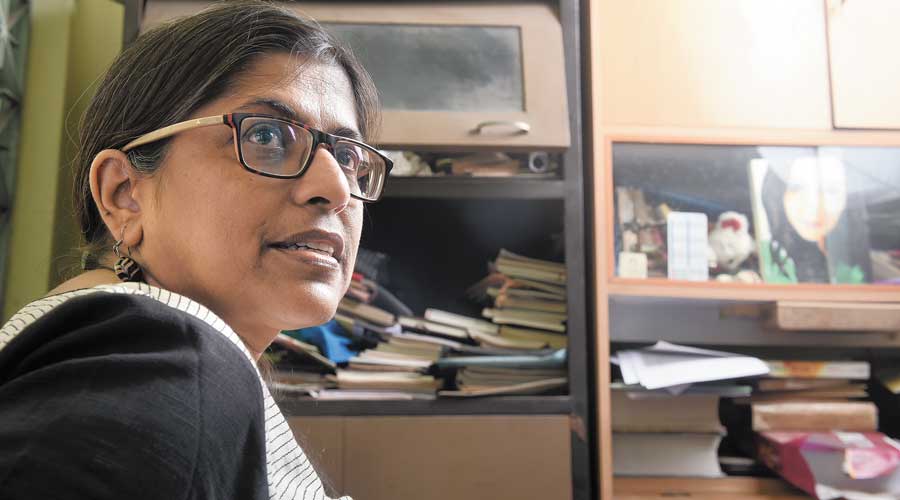In the early Nineties, when she was beginning her work as a disability rights activist, Shampa Sengupta was part of an effort to set up a school for disabled children in a Behala locality. On the first day of the school, some residents from the neighbourhood tried to stop the disabled children from entering the locality, as they would somehow be a “bad influence” on the “normal” children. Once the children were inside, angry residents threw bricks at the school.
“This is unthinkable now,” says Sengupta, 56. The understanding of disability has changed in the last three decades. The Behala school, started in such an unfortunate manner, is now well-known as Mentaid Special School and also enjoys the support of the neighbourhood.
Disability is also no longer seen as “something requiring charity”, says Sengupta. Instead, the conversation about it has changed to one of rights. This change has been possible, says Sengupta, because of the disability laws, first in 1995 and then in 2016, and the disability rights movement. “Even if a law is not implemented, it helps,” feels Sengupta, who started Sruti Disability Rights Centre in the city in 2005 for advocacy of disability rights with its focus on sexual violence.
These achievements, however, need to be measured against what is yet to be achieved. Which is immense.
Life is harsh for a person with disability. But in this part of the world, generally, a disabled person faces insurmountable difficultly because of the way spaces around him or her, as well as institutions and facilities, are designed or structured. Or not. Something as innocuous as a blink-and-miss OTP can cause a minor trauma to those not trained in the ways of the smartphone, which itself, ubiquitous as it may seem, is not something many persons with disability can use.
Small things can leave out a large number of people, not to mention entire processes at offices or banks that can exclude the disabled entirely.
The disabled are denied access because most systems are aligned with each other to render them invisible, more or less, never mind the signs in public transport. It is also because the non-disabled shut their eyes, or just stare.
A lot would change, says Sengupta, if all children grew up seeing other kinds of children and people.
As it had happened in Sengupta’s case. Her mother, a schoolteacher, had wanted a full-time caregiver for her daughter. When the caregiver arrived, it turned out that she was hearing impaired. Though relatives said a child could not be put under the care of such a person, Sengupta's mother insisted otherwise. “Ma’s decision had a profound impact on me,” says Sengupta.
Later Sengupta attended Jadavpur University and studied comparative literature, which did its bit. “I believe it’s literature that gives you a world view,” she says. She completed a certificate course on special education from Indian Institute of Cerebral Palsy, but realised soon that teaching did not interest her. This would make her shift her focus to advocacy.
Sruti Disability Rights Centre is not a formal group and relies on volunteers. Sengupta is also joint secretary of National Platform for Rights of the Disabled (NPRD), India's largest cross-disability network with several lakhs of members from different states.
Sengupta also made a choice in her personal life that deepened her understanding, even as it took its toll. She married a person who had told her about his mother’s mental disability at their first meeting. “That’s how I became a caregiver, but by choice. Taking care of a person with mental illness took its toll. My mental health conditions deteriorated,” she says. She eventually came out through “self-counselling and self-analysis”, but feels that it is very important to talk about the mental health of caregivers.
She points out how the pandemic has devastated the lives of the disabled.
Most disabled people work in unorganised sectors and many of them have lost their jobs. “We can see many disabled people working as hawkers at railway stations. During the second wave, not just disabled children, but also young adults who need day-to-day support and care, have lost their parents.” The government has not thought about them. The CoWin website remains inaccessible for those with visual impairments, as did the Arogyasetu app.
The majority of web platforms is not accessible to the visually impaired and they cannot attend online classes, she points out. Masks stop the hearing impaired, who communicate with lip-movement, from expressing themselves. Special schools remained closed, children were denied therapies. “As people were asked to avoid ‘touch’, people with mobility problems who depend on others found it difficult to move around as our cities are not barrier-free. Other than Kerala, no state started a Covid helpline with sign language facilities.
In October last year, Sengupta wrote to Calcutta Municipal Corporation (CMC) to include the disabled in the study CMC was conducting on persons with comorbidities during the pandemic. “It is strange that NGOs have to say this,” says Sengupta. She is yet to hear from the authorities.
Sengupta is particularly disturbed by the rise of sexual violence during the pandemic. The sexual violence that the disabled experience is an area little spoken about. It is an area she began to work in after the initial years.
“I was the first employee of Swayam, an organisation working against violence on women,” says Sengupta. “The gang rape of a young woman with speech and hearing impairments in 2000 changed my path. I decided to work on the intersection of disability and gender,” she says.
“When one works on intersections, the challenges are bigger,” she adds. “Not all women's groups understand disability issues nor are disability groups aware of gender rights,” says Sengupta. “I got the opportunity of meeting Verma Committee members after the 2012 Delhi gang rape case. The members told me that they did not get many recommendations about disabled women. They kept on asking for more case studies from me to understand the issue better. That's how our criminal law now includes the issue of disabled women now," says Sengupta. She considers the fact that both the disability law of the country as well as laws on sexual violence include the issue of women with disabilities, for which she had worked hard, the milestones of her life.
“Sometimes the FIR is just not written correctly. A speech-impaired person may be mistaken as deaf. The entire case changes then,” she adds. “For this the police, the authorities or institutions cannot be blamed.”
What is really responsible is an appalling lack of information spread across communities and institutions, still breeding ignorance and fear. Information about the law, the rights, the facilities can empower the disabled. Even now the parents with a disabled child simply may not know at all where to go, which school to get their child admitted to, what to do at all.
With information, is required empathy. Which brings one back to the argument for an inclusive education that has all children growing up together, though the model comes with its own challenges. But empathy come naturally to children. “Disabled children who have gone to mainstream schools always say that their schoolmates were their friends. If they faced discrimination it was from teachers and authorities, the adults,” says Sengupta.
While growing up, learning to respect difference is very important now, when right-wing politics wants to make uniformity a code. “It is dangerous as far as disability is concerned,” says Sengupta.










